Fighting With Your Partner: Here’s How You're Doing It Wrong
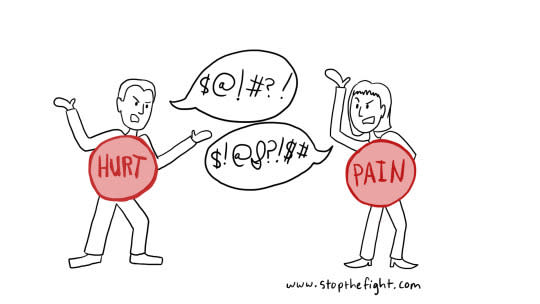
(Illustrations courtesy of Michelle Brody/Stop the Fight!)
Fights are cycles – and that’s why they are so hard to solve. But according to clinical psychologist Michelle Brody, PhD, author of Stop the Fight! An Illustrated Guide for Couples, seeing the big picture with those cycles can help unlock them.
Here, Brody shares with Yahoo Health the most common causes for our biggest fights, along with some unique illustrations to help us understand the root of our conflicts.
YAHOO HEALTH: Fighting is inevitable. Why is it such a necessary evil?
MICHELLE BRODY: Even between loving couples, there will always be misunderstandings, and there will always be times when you inevitably miss being there for each other in just the way you each need. When those misses happen, it’s human nature to complain or blame the other partner for hurting you. The blamed partner feels unfairly accused and defends his or herself. The defensiveness makes the first partner feels unheard and more hurt, so there’s more complaining and defending — and there it is, a fight.
What’s the difference between a “good” fight and a “bad” fight?
A good fight is one that ultimately ends with a resolution that brings a couple closer. A bad one simmers under the surface unresolved. How to turn a fight into a good fight? After the fight is over (it’s nearly impossible to do during a fight), be open to listening to each other in order to learn about the TWO hurts that happened during the fight. Both people got hurt in the fight — one because their need was missed, and the other because they felt unfairly accused. When both partners care about both hurts, and seek to soothe them, the bond can be healed. The more times you experience a reconnection and a repair after a fight, the more the security and trust builds because you know that you can repair from difficulties. On the other hand, the fight becomes a “bad” fight if you don’t get to repair from the fight and your hurt doesn’t get soothed.
Related: How Your Relationship Changes After Someone Cheats
Is there a common mistake people make again and again when they fight with their significant other (or anyone)?
There are two parts to the mistake that keeps people stuck in fights: the way we view the problem and how we act as a result. Because we are in pain, we demonize the person who we see as causing the pain, and then act defensively against that monster. We think:
He/she is the problem
His/her behavior is the problem
I have to fix his/her behavior
I have to stop him/her from spending, controlling me, abandoning me, withholding sex, clinging, ignoring me…
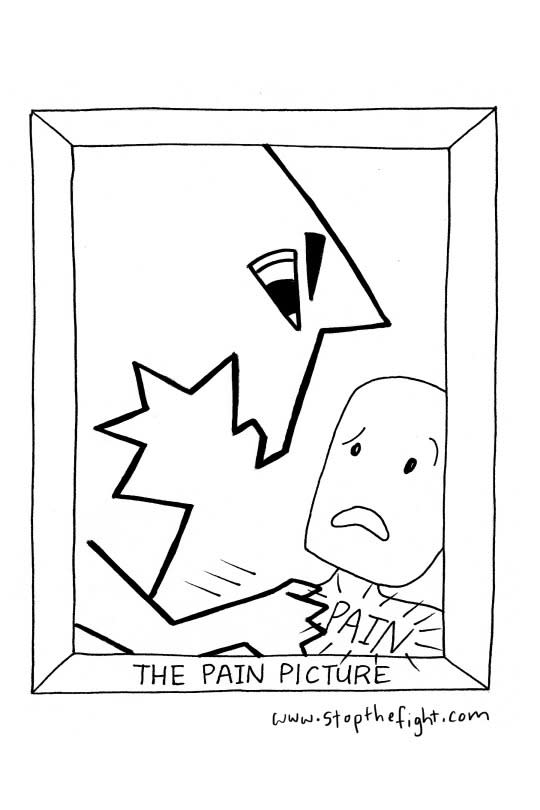
And the person we are fighting with tends to think the same about us. When two people think about the fight in one-way terms — I’m the victim, you are the problem — it guides them to act in fight-promoting ways. We turn our hurt into retaliation, attempt to “win” against our “enemy,” fix the “problem partner,” or we try to be proven right. All of those things keep fights going. What it takes to actually stop fights is to do the opposite — suspend your need to win, stop trying to fix the other, be open to the reality that there are two truths in a fight, and see the other person’s perspective.
What is the top source of fights you see?
We all know that fights can explode from very small triggers: a difference of opinion (Why do you like such dumb movies?) or a frustration with one of your partner’s habits (Did you lose your keys again?!?) or a misunderstanding (Did you or didn’t you embarrass me at the party?). Once we get triggered to be in fight mode, we start saying things that are even more hurtful to the other person and the pain piles up for both partners as the fight continues.
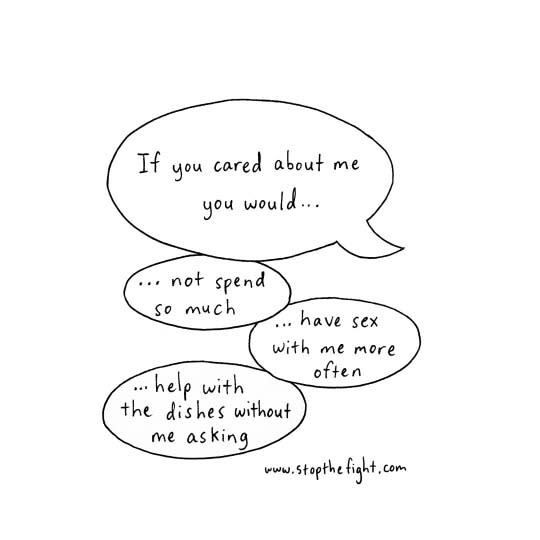
Couples can have lots of disagreement about many topics (sex, money, household responsibilities, kids, how to spend time, etc.), but what makes them painful is when those disagreements start to raise doubts about whether your partner cares about you: “Do you see me? Are you there for me? Do you care about me?
Why is it so hard to stop fights, and what are some of the most common fights in relationships?
Fights are hard to stop because they get circular. Each person tries to solve the problem from their own side, and what they each choose to do makes the fight worse, not better. Here are some examples of common relationship fight cycles:
Circular Fight #1: The Right-Wrong Fight
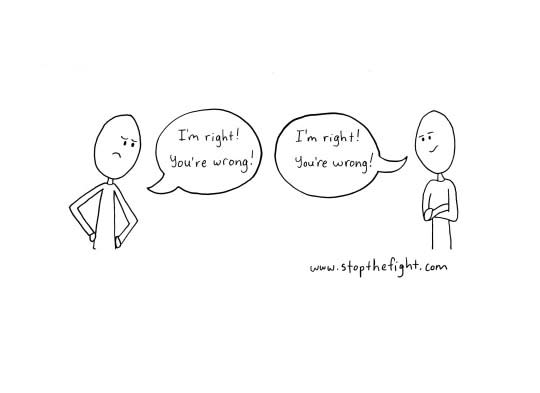
You see the situation in one way and your partner, amazingly, sees it a completely different way. When your partner says how they see it, you urgently feel you need to correct him. Your urgent correcting usually leads him to urgently want to correct you back, and the fight is off and running. The more you insist that he is wrong, the more forcefully he will dig in to prove that he is right and you are wrong. And so on… and so on… in an endless cycle.
Related: The 2-Second Relationship Fix That Works
Circular Fight #2: The Nagging/Tuning-Out Fight
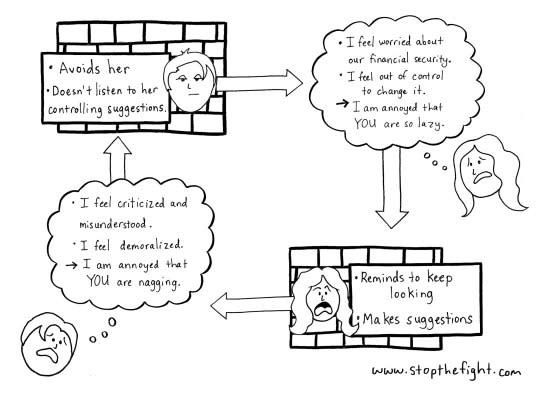
Here, Julie wants to give Nigel advice about job-seeking because she’s worried he isn’t doing enough. Nigel feels judged, criticized, and nagged, so he tunes Julie out and doesn’t follow all her “controlling commands.” Feeling ignored, Julie gets even more aggravated and nervous as she sees Nigel being even more passive. The more she nags, the more he tunes out, but the more he tunes out, the more she nags. Both the nagging and the tuning out keep the fight going.
Circular Fight #3: The Bad Reputation Fight
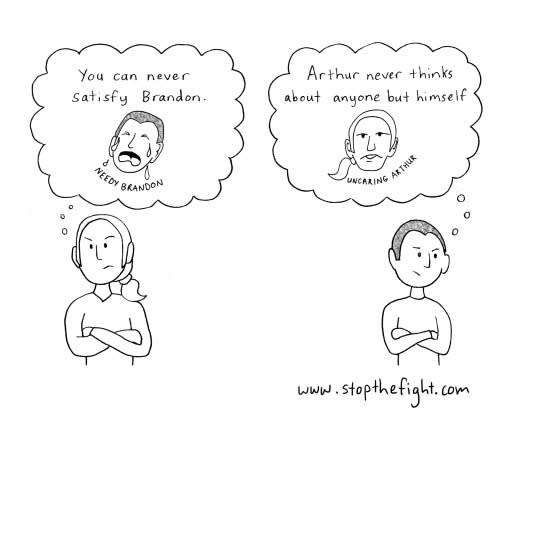
Brandon feels Arthur doesn’t focus enough on the relationship and is always choosing to do something other than being together. Arthur likes a little more independence and feels annoyed that Brandon always gives him a hard time when he wants to go out. Over the years, they have fought about this so many times that they have begun to label each other in very unflattering terms. But the more Arthur calls Brandon “needy” and stays away from him, the more Brandon calls Arthur “selfish” and complains that he’s never around. They label each other with bad reputations and the fight cycle between them just reinforces those labels.
Circular Fight #4: The Sex Fight

Sid is suffering with not enough sex in his relationship with Kate. But the more Sid tries to get out of the desert of no sex by asking, begging, hinting, and complaining, the more Kate feels turned off, pressured, and uninterested. But the more she avoids Sid, the more rejected and deprived he feels. It’s a vicious cycle and neither one of them can seem to get out of it.
Circular Fight #5: The Money Fight

In money fights, often one person worries more about saving money and they try to do whatever they can to keep the other from overspending. But the other person wants to be able to live a little and not feel so controlled by the other person. The fight gets circular when they both try to protect themselves from the pain on their own side.
Related: What Your Reaction After A Fight Says About Your Relationship
How can you get out of one of these circular fights?
The first step in getting out of a circular fight is to step back and see the big picture of the fight — to actually recognize that the fight IS circular.

That means that while you don’t intend to, BOTH of you are contributing to the fight in the way that you are judging, labeling, and reacting to each other. Once you see the pattern of the fight, it becomes easier for you each to stop blaming each other. Instead, you begin to see how you are each trying stop your own pain, and by doing so you are inadvertently causing each other’s pain. Once you see the cycle, the big picture of your fight, you can claim responsibility for your half — and you can start to see your partner as a fellow sufferer in a cycle that is hurting you both. When you see each other’s pain a bit better, you can empathize with it, and agree to work together to fight the cycles instead of each other.
For more ways to end these fight cycles, check out “Stop the Fight! An Illustrated Guide for Couples.”
Read This Next: 5 Ways Your Relationship Can Be Toxic to Your Health
Let’s keep in touch! Follow Yahoo Health on Facebook, Twitter, Instagram, and Pinterest.
Have a personal health story to share? We want to hear it. Tell us at YHTrueStories@yahoo.com.
